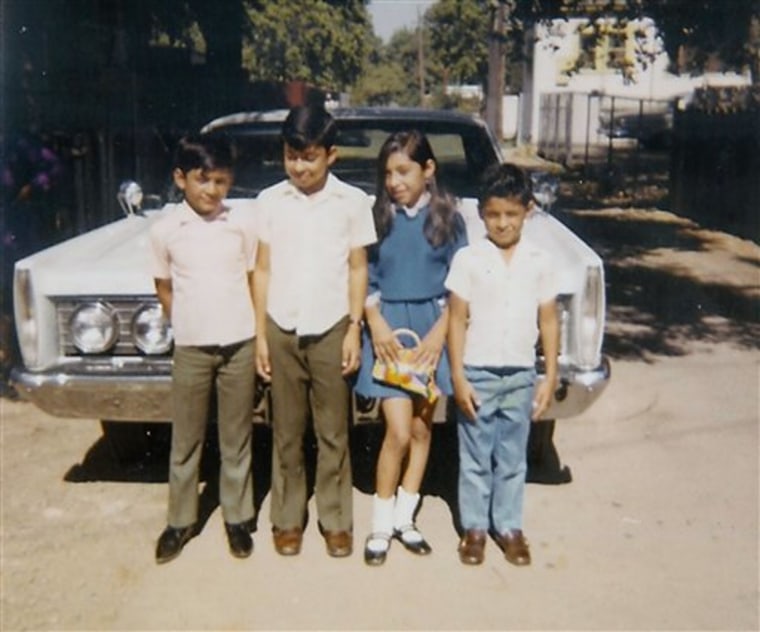He toiled in California's farm fields alongside his Mexican migrant worker parents and didn't learn English until he was 12. Now Jose Hernandez, NASA astronaut, is about to rocket into orbit.
His parents will be in Florida next week for space shuttle Discovery's launch, as will his two older brothers and sister, who also worked the cucumber, sugar beet and tomato fields back in the 1960s and 1970s.
"A lot of kids loved summer vacation," Hernandez said in a recent interview. "We dreaded it because we knew what that meant. That meant we were going to be working seven days a week in the fields."
Hernandez, 47, vividly recalls being dusty, sweaty and tired in the back seat of the family's car after a hard day of labor. Before starting the engine, his father would look back at his children and tell them, "Remember this feeling because if you guys don't do well in school, this is your future."
"That was pretty powerful," Hernandez recalled.
Parents had third-grade education
All four took it to heart. Each graduated from high school, "a moral victory" for third-grade educated Salvador and Julia Hernandez, now 71 and 67 years old, respectively. Each went to college, "the icing on the cake," according to their youngest child.
"And, of course, now being an astronaut, to them that's just unbelievable," said the soon-to-be spaceman. "I think they're higher in orbit than we're going to be in."
Discovery is scheduled to blast off in the wee hours of Tuesday. Seven astronauts will be on board for the space station supply run, including two Mexican-Americans, as it turns out, and a Swede.
Those who deal with migrant farm workers also are soaring.
"When we see an example like Jose, we are so happy," said Matthew Sheaff, a spokesman for the Association of Farmworker Opportunity Programs in Washington. "It's an example that anybody can break the cycle of poverty that they live in."
"It's a great model for these farm worker kids" just now heading home after picking crops this summer, Sheaff added.
Starts ‘Reaching for the Stars’
Children are, in fact, Hernandez's focus.
He's formed a "Reaching for the Stars" foundation in Stockton, Calif., his hometown, to inspire local youngsters to excel in math, science, engineering and technology.
Whenever he gives motivational talks, "I say, 'Look, I can trade poor stories with the best of you here, and I'll tell you that I'll probably be coming out on the shorter end of the stick than you will."
Each year, the Hernandez family would make the two-day car trip from La Piedad de Cavadas in the central Mexican state of Michoacan to California in March, working their way northward with the crops, until November. Then it was back to Mexico until the next March. The parents insisted their children always attend school.
Hernandez, who was born in French Camp, Calif., remembers asking his second-grade teacher for a couple months' worth of homework when it came time for the family's annual pilgrimage back to Mexico. The teacher urged his parents to set down roots; his father eventually started a trucking business in Stockton.
Astronaut ‘through osmosis’
Two things pointed Hernandez toward space.
During the Apollo moon landings, Hernandez would hold the rabbit ears steady on the family's old black and white TV for good reception. He likes to kid "it's through osmosis that I got to become an astronaut."
Then, during his senior year, he learned of NASA's first Hispanic astronaut, Franklin Chang-Diaz, who was born in Costa Rica.
"I said, 'Hey, if he came from poor, humble beginnings and he became an astronaut, if he can do it, why can't I do it?' " Hernandez said. He gravitated toward math and science because of his English limitations.
Hernandez ended up getting bachelor's and master's degrees in electrical engineering and, in 1987, went to work for Lawrence Livermore National Laboratory in California. He became an expert in X-ray physics, helping to develop the first full-field digital mammography system. And during a stint at the Department of Energy, he helped with the disposal of Russian nuclear materials.
He moved to Houston in 2001 to work at Johnson Space Center as an engineer, working his way up to branch chief. He was selected as an astronaut in 2004, after 12 years of trying.
Hernandez now has five children of his own, ages 6 to 14. Wife Adela runs a Mexican restaurant just outside the Johnson gates, aptly called Tierra Luna Grill, Spanish for Earth Moon Grill.
Attracting a new audience
By coincidence, another Mexican-American will be aboard Discovery, third-generation Danny Olivas, who grew up in El Paso, Texas. It will be the first time two Hispanics fly together in space.
NASA's first bilingual Twittering astronaut, Hernandez — Astro_Jose — plans to file tweets from space. During the 13-day flight, he will help three of his crewmates suit up for spacewalks and haul thousands of pounds of supplies over from the shuttle.
His space shuttle commander, Rick Sturckow, is as inspired as anybody by Hernandez's story. He, too, grew up in California, on a turkey and cattle farm.
With his language skills and personal history, Sturckow said, Hernandez is "attracting a new audience to NASA that we might not normally reach otherwise."
